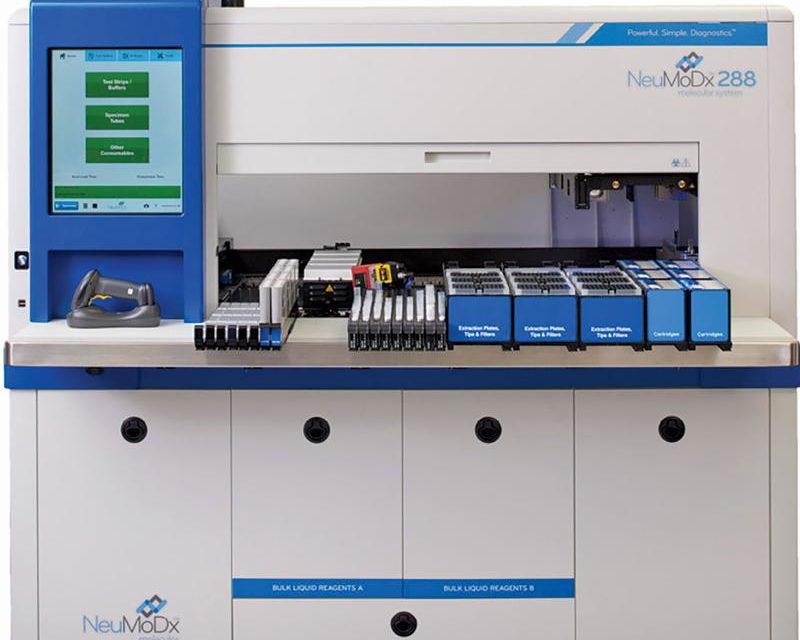In February, the leaders of NeuMoDx Molecular Systems realized that a global pandemic was underway. In just three weeks, the local company adapted its medical diagnostics devices to test for the virus that causes Covid-19. On March 20, it applied for emergency use authorization from the FDA, and got the approval ten days later.
At the time, the machines were being used mainly to test blood for viruses like hepatitis B and C, for sexually transmitted diseases, and for pathogens that could pose a threat to transplant patients. Since then, “everybody who had [the device] before has converted” to Covid testing, says NeuMoDx president and COO Sundu Brahmasandra, with most new orders also due to ceaseless coronavirus testing demand. “From April onwards, 99 percent of our testing has been Covid.”
NeuMoDx (pronounced new∙MOD∙X) has been so successful that in September Dutch diagnostics giant Qiagen, which was already handling NeuMoDx sales and service in Europe and other global markets, exercised an option to buy NeuMoDx, paying $248 million for the four-fifths of the company it didn’t already own. For local venture capital firm Arboretum Ventures, which invested in NeuMoDx in 2012 and 2014, the sale “was our single largest cash return,” says Arboretum founder and managing partner Jan Garfinkle. Garfinkle calls Brahmasandra and NeuMoDx founder Jeff Williams “the best of the best” in the molecular diagnostics industry.
Williams formed what was then Molecular Systems Corporation in 2010; Brahmasandra, a chemical engineer, arrived in 2012 to develop the company’s product line. Its two automated testing devices went on sale in 2018, one capable of loading ninety-six patient samples and the other 288.
Both machines employ a liquid-handling robot to move patient samples and chemicals known as reagents in and out of various chambers, including tiny “microfluidic” channels barely a thousandth of an inch wide. They can isolate, amplify, and detect pathogen genetic material in whole blood, plasma, urine, saliva or nasal swab.
NeuMoDx’s devices are unique, says Brahmasandra, for their combination of high capacity, or throughput, and their speed. Other machines offer one or the other, but not both. The larger device can process 300-plus samples in an eight-hour work shift, with the first results appearing within forty to eighty minutes.
About a dozen institutions in the U.S., and more than eighty in other countries, use NeuMoDx machines for Covid testing, including Henry Ford Hospital in Detroit, St. Jude Children’s Research Hospital in Memphis, and Johns Hopkins Medicine in Baltimore. A recent paper in the Journal of Clinical Virology showed the NeuMoDx system, at three different institutions, to be at least as accurate as standard manual methods for Covid testing, and far more efficient. Johns Hopkins cut its overall Covid test turnaround time in half, from twenty hours to about ten, after introducing the NeuMoDx device. “We use other automated systems currently for diagnosis, but the NeuMoDx has been the most heavily used,” emails Hopkins pathologist Heba Mostafa.
NeuMoDx has quadrupled its production of testing machines since the pandemic began. Working in two buildings in the Eisenhower Commerce Center, roughly 220 employees now turn out about twenty a month. Output of kits of reagents and consumables has increased tenfold, to 700,000 to 1 million tests a month.
It could have been more, Brahmasandra says, if not for shortages of everything from reagents to machine parts to the pipette tips that the robot uses to transfer fluids. Given those bottlenecks, Brahmasandra says, “there’s only so much we can do.” And the U.S. still doesn’t have nearly enough rapid Covid testing capacity to effectively blunt the virus.
Brahmasandra believes that America’s Covid-19 testing debacle could have been averted. “A pandemic like this illuminates again the importance of having a supply chain that’s efficient and reliable and protected,” he says. “It would have been a much safer world if we had been able to scale the diagnosis up front, and use it in larger settings or more widespread settings.”
NeuMoDx is Brahmasandra’s second successful local company. A native of Bangalore, India, he earned his PhD in chemical engineering in the U-M lab of Mark Burns in 2001. The previous year Brahmasandra and a fellow grad student from India, Kalyan Handique, founded HandyLab to develop a portable “lab on a chip” to analyze DNA, capitalizing on investor interest in a prototype device they first reported in the prestigious journal Science. That project never bore fruit, but the company, with Williams as CEO, did eventually market a successful automated diagnostic testing machine. Becton Dickinson bought HandyLab in 2009 for $275 million. Within a year, the medical device giant announced that it was closing the local HandyLab offices and moving operations to Maryland.
There’s no sign that Qiagen plans anything similar for NeuMoDx, says Brahmasandra, who points out that the company has actually hired about thirty local workers since the acquisition, with no layoffs. The only departure was Williams. “It was Jeff’s decision to leave, and let Qiagen basically take over the leadership of the company,” says Brahmasandra. (Williams did not reply to emails.)
In the short term, NeuMoDx seems safe, given the exploding demand for its products amid the pandemic. The Ann Arbor company “is definitely a strong pillar of growth that we see a lot of potential for at Qiagen,” says Robert Reitze, Qiagen’s senior manager for public relations. “And so there’s no indication that anything like [layoffs] will occur.”
HandyLab’s other co-founder, Kalyan Handique, also helped build a second successful local medical diagnostics company: in 2011, he joined founders Priya Gogoi, Saedeh Sepehri, and Chris Siemer at Celsee Inc. The company, whose products enable researchers to capture and analyze individual cells, was sold in April for $99.3 million.


